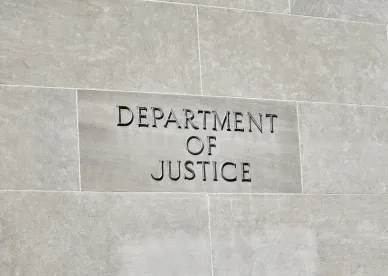Earlier this year, Mintz covered the U.S. Department of Justice’s announcement of a deferred prosecution agreement resolving criminal charges against Florida Cancer Specialists & Research Institute LLC (“FCS”) in a 17-year market allocation scheme. As part of that deferred prosecution agreement, FCS agreed to pay the statutory maximum monetary criminal penalty of $100 million. That penalty, however, and the deferred prosecution agreement itself, related only to the corporate entity itself, not to the individuals who actively engaged in the conspiracy.
Today, the DOJ announced a grand jury indictment against Dr. William Harwin, founder and former President of FCS. The indictment, much like the Information filed with the FCS deferred prosecution agreement, tells the story of a naked restraint on trade, one that is per se illegal under Section 1 of the Sherman Act. The indictment alleges that Dr. Harwin had an agreement in place with an unidentified “Individual 1” at “Company A” whereby FCS would agree to not provide radiation oncology treatments to patients in Southwest Florida, and in return, Company A would agree to not provide medical oncology treatments to patients in the same region.
In conspiracy cases, there is rarely direct evidence of the charged offense, for example, a written agreement. Instead, the prosecution must rely on indirect evidence such as the monitoring and enforcement of an alleged conspiratorial agreement. Here, the indictment alleges that at multiple times Dr. Harwin sought to monitor and enforce his conspiracy, and memorialized his actions in multiple ways, including:
-
After learning that Oncology Company A was administering the drug Provenge to cancer patients (a form of medical oncology), Dr. Harwin informed Individual 1, “we expect you will end this”;
-
After Oncology Company A’s acquisition of an oncology group that employed oncologists, Dr. Harwin instructed Individual 1 to “Make then[sic] disappear.”; and
-
Specifically noting in correspondence that “I told [Individual 1] that there is no way I will be ok with [Oncology Company A] hiring med oncs, ours or others. Period.”
In the DOJ’s press release, Assistant Attorney General Makan Delrahim noted, “As the charge demonstrates, the division remains committed to holding culpable executives accountable for their crimes, especially when they impact vulnerable Americans, such as those in need of life saving treatments.”
The indictment serves as a stark reminder that that this type of behavior—market allocation—is a crime. Health care companies should not be deterred, however, from pro-competitive competitor collaborations, especially during the COVID-19 crises when many providers are facing supply and equipment shortages. Although most such collaborations raise no serious antitrust issues you should still make sure your company is aware of the risks and has a robust compliance program in place to train your executives. After all, as illustrated here, executives are not shielded by corporate formalities, and market allocation and other conspiratorial behavior carries criminal liability not only for the corporation, but also for executives themselves.






 />i
/>i

